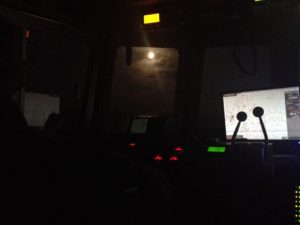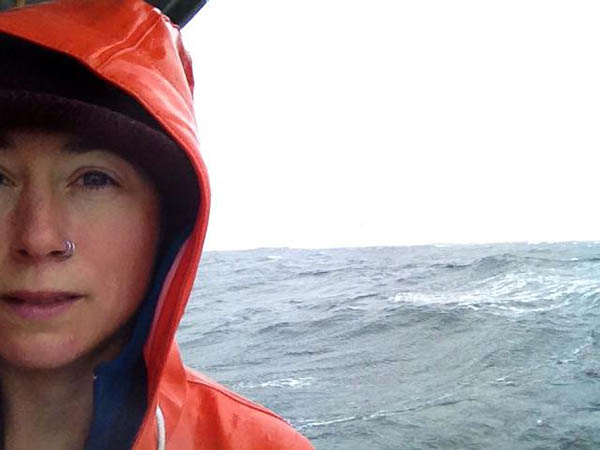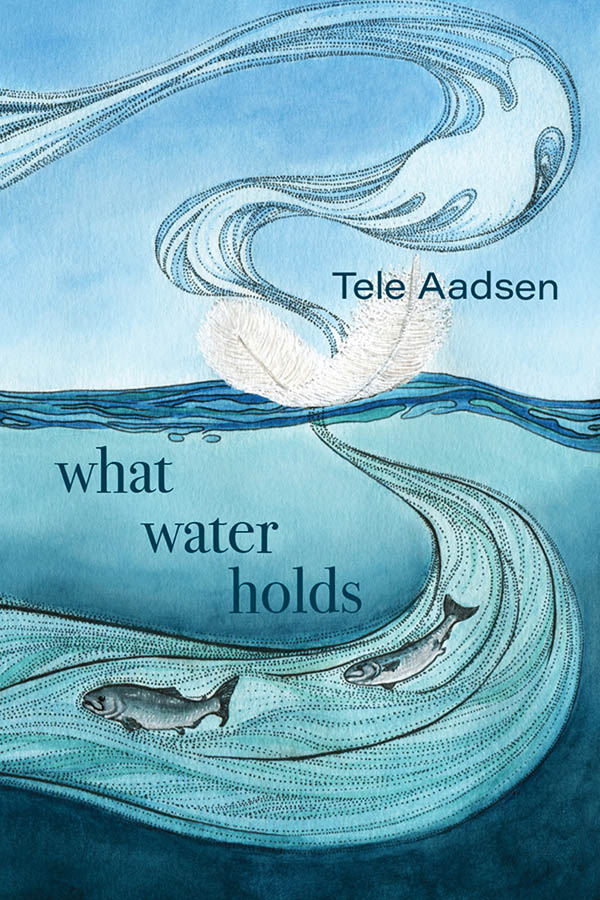August:
The Mayday wakes me. The radio volume is low, but it reaches the fo’c’sle. A man, his voice an octave shy of hysteria, yanks me from the bunk, pulling me upstairs.
“There’s a boat one mile off Cape Addington taking on water! It’s a yellow-and-black troller, wood, two people on board. He’s got three or four pumps going in the engine room and a guy bailing in the fish hold.”
“Roger, Captain, can you spell Cape Addington?”
“A – D – D… It’s on Noyes Island!” The engine screams in the background. “He’s gonna need another pump. I can see four anchor lights from here, I know somebody’s got a pump they can give us!”
We’re anchored in the next bay down from Addington. Us, and a small fleet of fellow trollers. I slide into the pilot seat. Rain washes the night, beading the windows. I don’t turn the lights on. There’s nothing to see except the solid red glow of the VHF. I pin my gaze on that light, willing it to pulse with another transmission.
Fishermen often know boats better than we know the people attached to them. All season we slide past each other on the tack, observing, assessing. Judging. Sometimes not knowing the person aboard as anything more than a miniature figure in neon raingear. Our boats represent us by proxy – our boats, and our disembodied voices on the radio. Identities are impressions, forged by boat maintenance, tack behavior, and radio conduct.
Only one boat matches this description. It’s been the bane of the fleet all season, most recently two days ago, when another fisherman got on 16 to call out the yellow-and-black troller that had turned right on top of him. It was a mild scold, little more than a “what’s up with that” rebuke. The response was an explosive diatribe hot and rank, fouling the airwaves. Our knives stilled mid-gutting as we stared at the deck speakers, stunned at the escalation. The initial caller was taken aback, too. “Whatever, man. You troll like a dumbass. And put a fuckin’ name on your boat, too.” Refusing to cede the last word, the young man shot more venom back.
Fishermen always say that we’re there for each other. That if you’re in trouble, it doesn’t matter who you are, what our differences are on land. That on the water, we’re family.
I want to believe that’s true.
We could be alone here, if not for low-slung constellations of neighboring anchor lights winking in and out of view as boats slowly twirl on their tethers, darkness broken only by the red glow of radio silence. I want to reach for the mic, tell the man someone is listening, someone is out here. But my transmission would be nothing more than interference; we don’t have the spare pump he needs. I want to believe that’s the reason for the rest of the family’s silence, too.
So I just sit in the dark and stare at the radio, arms wrapped around my knees pulled into my chest. The position a marine safety instructor taught, one that will preserve your body heat in the water. One that might help keep you alive.
The radio snaps to attention. “I’m almost to him, should be there in another five minutes! I’m gonna raft up to him and see what we can do.”
The Coast Guard asks for further description of the boat in trouble. The screaming engine threatens to drown the man’s wretched reply. “It’s my son.”
September:
The weather hits in the night. We’ve spent the run south pushing to stay one step ahead of this gale, only to have it pounce on the midnight shift.
Caught in the ocean’s convulsions, Joel and I go very still. Him at the helm, me alongside, both of us pinch-lipped and vigilant, hyper-alert. We don’t speak, just watch for what’s ahead. Waiting. The autopilot fights to hold its course. Glass jars chatter in the galley. I stormproof the cabin as best I can. Bear the Boat Cat looks uneasy, sitting stiffly beneath the table. I tell Joel I’m going to make sure her safe space below our bunk is clear. I have a bad feeling she’s going to need it.
The fo’c’sle is a disaster. Cabinets flung open, books thrown from the shelf. Margaret Atwood, Ariel Gore, and Neil Gaiman sprawl across the bunk in a disheveled threesome. I’m shoving everything back into place – some place, any place they might hope to stay until the weather comes down – when the world falls out from under me.
“Oh, fuck,” I hear Joel bark. The engine drops to an idle. The Nerka pitches starboard, an abrupt lurch followed by a crash. Not one crash, but the staggered percussion of many heavy things making sudden, artless impact. Flying up the stairs, I brake hard. All five drawers have launched from the pilot seat, hurled across the cabin in brutal disarray. The space beneath the table is a ruin of wrenches, hooks, and knives.
“Bear! Fuck, where’s Bear?”
Gingerly excavating the debris, I release my breath. No crushed cat. I find her under our bunk, eyes like marbles. She must have zipped down, a whisker ahead of the attack. I stroke her rigid body and murmur apologies.
When we trade wheel watches, Joel isn’t in the fo’c’sle five minutes before returning with a scowl. “There’s no way I can sleep down there, the way we’re bucking. I’m just going to rest up here.” He’s too tall for the daybunk but climbs into it anyway, bracing socked feet against the back of my seat.
Bear slinks up the stairs, too. With a wary glance at the replaced drawers, she flattens herself again under the table, appearing at once boneless and tense. The anchor dips, the guts of a wave shattering against sixteenth-of-an-inch window panes. I stand in a hopeless effort to see over the lunging bow. My fingers clench the console.
Someday, from some safe space on the far side of fear, will I reduce this storm in classic fisherman’s understatement, head tilting to shoulder in minimalistic shrug? We took some green water. Will I gaslight myself? Time does that; time, and our future self’s need to whitewash past danger.
Darkness fuels fear. In a world reduced to black night, white foam, green water, you can’t assess conditions as a whole, can’t brace yourself for anything beyond the next toothy wave. For everything I can’t see, there is sound. The river running down the roof. Erratic one-two, one-two notes tweeted like a canary, a cabinet popping open with each up-surge, closing as we slam back down. The violence of water hitting the hull just so – a resounding smack that, no matter how often I hear it and assure myself it’s just water, it’s just water, always makes me jump. Reflexively, I conduct a mental tour of our safety gear.
I think back to the beginning of our season, when the Nerka first headed out to the Fairweather Grounds. It was so easy to trust the ocean when tucking into that cheerful blue, taking at face value the snake-oil promises of a calm day. So easy to imagine myself unafraid on the water. That was a lie. Or maybe it wasn’t. Maybe it’s not so much that I’m afraid on the water as I’m afraid of the instant when everything changes – the moment you don’t see coming, when you suddenly feel yourself falling from shitty into very, very bad. The moment you realize you’re in trouble is the moment too late; there’s no turning back or avoiding what now is. There’s only the question of how you will respond, and if your response will make a difference.
Today:
I’ve been back on land for months. Yet I’m still hugging my knees to my chest, staring at a solid red glow, waiting for someone to break the radio silence. I’m still clenching the wheel, watching green water shatter against the windows, praying they’ll hold, bracing for the next hit. The landscape has changed. It shifts and tumbles, every day newly precarious. I review our safety gear, sometimes wondering if it’s time to grab the go-bag. Wondering, if so, where there is to go.
The yellow-and-black troller survived that August night. Family came through, other boats stepping up to share pumps. And Joel, Bear, and I made it though our night, too; the weather broke with dawn, washing us limp and stunned into a new day. Thinking back to those nights and others, times my heart lodged hardest in my throat, I realize it’s less a matter of going, more about getting through. The ocean gives us everything we need to do this. Resolve; Vigilance. Endurance; Solidarity. Hope. Love.
So I’ll be here, standing by the radio, hands steady on the wheel. I’ll keep going, trusting that even when I feel alone charging into dark, storm-tossed nights, dawn will come. Trusting you’re out here with me – and you, and you, and you – and you’ll do the same. In this way, together, we will weather this.
I wrote this in January 2017, for Oregon’s FisherPoets Gathering. Gratitude to Cirque for publishing it in their Summer 2017 issue, Vol 8, No. 2. Revisiting it now, in November 2017, the words feel like they were written by someone else, someone stronger and more optimistic than I currently am. Maybe you are that someone? If so, please share this wheel watch with me; tell me how to be a person who trusts in the dawn.




Beautiful writing, my friend. As always. Just finished (really!) eating some really lovely Nerka salmon for dinner and was telling my daughter what fine people you and Cap’n J are. I believe that you, more than anyone, is a person who trusts in the dawn.I can share the wheel with you while you work through the darkness. xxoo
Thanks, love. I’m glad you enjoyed the fish & could share it with A. Thanks for your companionship & belief. These days, man… I wrote this 10 months ago, but it feels like years. I know you understand. I do still believe in the dawn… Or, maybe more importantly, I believe in the necessity of living with that belief, fighting for it, without guarantee. What else is there?
xo
I am always glad when you post something and I can share it with people who need to hear it. Tomorrow maybe my coworkers.
I think we just have to keep being the dawn. Keep helping each other. Make our movements kinder, more fun, more open, more welcoming, than the tempting simplicity of us-versus-them. Gain strength by helping the people and places that help us.
Thanks, Sarah. You’re leading by example, & a source of inspiration & hope for me.
(Unrelated but on sharing with your coworkers: I have smoked salmon for you lovelies. We’ll talk.)
It’s good Tele, I could feel it, and it felt “true,”
I don’t have words. But I do believe in the dawn.
Your writing is so powerful. Thanks for sharing.
I seriously feel a bit seasick, as though I were there with you, cold and tossed about like your literary “threesome (ha!). Amazing, beautiful, powerful writing. Thank you!
Been there. Literally. During a storm, after all has been done that can be done, the only thing left is to surrender. Both at sea and on land, I have found comfort in the words of the Serenity Prayer:
God grant me the serenity
To accept the things I cannot change;
Courage to change the things I can;
And wisdom to know the difference.
Dawn is breaking. Mast lights are on the horizon. You are not alone. Remember to Breathe. Peace.
Read more: http://www.lords-prayer-words.com/famous_prayers/god_grant_me_the_serenity.html#ixzz4xet4gPlJ
Oh my. Your writing brings me to tears. Again. The sharing of it creates the dawn. The connection. The reminder that there are others out there to weather the storms with. And the beautiful reminder to let go of the notion of OTHER. To remember how we each need to be there in whatever way we can be for each other. And you and Joel are just the best at being there. And this writing brings me hope. We do so need each other. Thank you. Thank you.
As I start each day in my comfy home spot a picture of the Nerka resting on calm waters with a huge mountain in the background comes into my view. My thoughts and prayers turn to you and Joel knowing that to make a livelyhood on an unpredictable ocean is risky business.
Your writing makes my heart race and brings a touch of reality about how frightening a storm could be in the blackness of night. Thank God for the passing storms and the promise of a new day at dawn. I am thankful for your safe return to your land home. I bet adaptable Bear Cat welcomes the change too.
Thank you for sharing.
Tele: Sounds like you’re worried your flame is flickering dim. I don’t want to say I have all the answers when someone is down. But when I become concerned my life is not going to continue to go on as planned, or as I’m accustomed to, I think what is the bare minimum I need to be OK?
I think what would I do if those close to me and I were on one of those refugee roads where they are barefoot and only have a bundle of things they can carry and maybe their dog or a goat? And I believe that even if we were wiped out (in one way or another) that my wife and I would salvage enough to end up some place warm, with enough food to eat. And there would still be at least some days when the sun would still shine.
Riveting, beautiful, humbling. Your words always pull me in, and take me someplace deeper. You writing makes me want to dig myself out, and write more of my own words. You inspire, Tele, and I hope you continue to seek a home for your story… because it should be read by others, who can be inspired as well.
Bullies on land or sea are the same. Harmful, hurtful, hateful, and increasingly so the further up the ‘food chain’ they are. Politically, we can VOTE; in our everyday fishing lives we can’t control the bullies any more than we can the weather or the waves. I try to stay out of harm’s way, fishing the way I hope everyone would by NOT being a bully. There are times when you can’t avoid confrontation, with either the weather or bullies, and then you just batten down the hatches and wait it out. I hope there is sunshine on the other side.
lexan, number 4 tyee pump with hydralic drive, and a firm grasp on the statistics. everything is allright until the second domino falls. you captured the moment perfectly.
Sounds like some of the times I’ve crossed Queen Charlotte Sound.
You’re spot-on, Eric — this was 2009’s run south, midway between the point of no return and Cape Caution. Glad you made it through all of yours, too.
I love the fact that I don’t read your pieces. You read them to me. I scan the words with my eyes, but I hear your soft voice speaking over the miles, reciting stories so honest and visceral and true. You are the real deal, my friend.
I dont know you personally, but recognize that we are cut from similar Grundens. I know some of the places you mention because Ihavebeen there too. I quit fishing when I had my own kids and it leaves a big hole in me. But there is more. I have started farming, with a fisher flair. My dawn comes earlier now, everyday, consistantly.
Somedays, that is just the way it is, somedays it’s too much to bear.
Thank you for sharing your voice, your struggle. Thanks for keeping my past relevant.